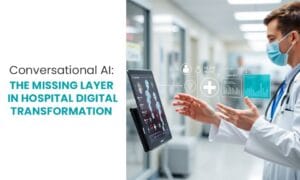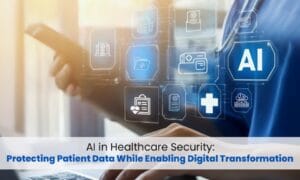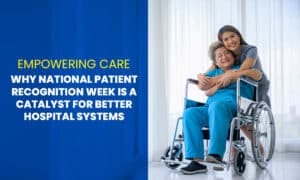
Using HIMS software for practice management is a need of today’s hospital and clinical practices management to match the evolving speed of today’s transforming healthcare environment, where patient expectations and operational complexities are higher than ever. Outdated systems, manual workflows, and disconnected departments lead to inefficiencies, diagnostic delays, billing errors, and loss of revenue. This is where AI-powered HIMS software, including an intelligent hospital management solution, plays a transformative role.
By automating administrative and clinical workflows—like patient registration, diagnostics, billing, pharmacy, inventory, and staff scheduling—modern clinical management tools improves accuracy, streamlines communication, and ensures compliance.
The adoption of HIMS software for practice management powered by AI ensures real-time access to records, optimises decision-making, and minimises human error, offering a 360° view of hospital operations. Implementing the best hospital information management system for hospitals and clinics gives a strategic advantage to facilities by enabling patient-centric care, faster service delivery, and empowered staff.
The Challenges in Managing Hospital and Clinical Practices without HIMS Software for Practice Management

• Outdated Systems Disrupt Operations
Many hospitals still rely on outdated systems, leading to numerous operational bottlenecks. A significant issue is fragmented data, which creates obstacles to smooth communication between departments. When doctors lack access to real-time patient information, the quality of diagnosis and treatment is directly impacted.
• Poor Resource Management Affects Service Quality
Another major challenge lies in managing resources efficiently. Inaccurate inventory records and poorly optimised staff schedules can lead to equipment shortages or overstaffing, both of which affect service delivery. Moreover, inefficient EMR software for hospitals adds to the administrative burden, pulling healthcare professionals away from patient care.
• Operational Inefficiencies Damage Revenue and Reputation
These ongoing issues slow down service delivery and affect overall patient satisfaction. Poor management often results in billing errors and compliance gaps. As a result, the hospital’s revenue stream takes a hit, and its reputation may suffer, both of which are difficult to recover in today’s competitive healthcare environment.
Introducing the Best HIMS Software for Hospitals and Clinics
To overcome these hurdles, healthcare providers need a robust, scalable, and intelligent solution. The best hospital information management systems for hospitals and clinics address every functional requirement—from administrative to clinical, financial to operational.
This software integrates core hospital functions such as OPD/IPD management, pharmacy, lab services, billing, appointment scheduling, and document handling. It also provides intuitive dashboards that enable data-driven decisions. Hospitals using such software for practice management enjoy seamless coordination between departments, leading to improved patient care and operational transparency.
A key advantage is the use of Artificial Intelligence to automate repetitive tasks. AI-powered analytics generate actionable insights that help management optimise staffing, forecast demand, and reduce downtime. This not only enhances decision-making but also boosts overall efficiency.
How HIMS Software for Practice Management Improves Hospital and Clinic Performance
• Well Managed Operations
Modern healthcare demands efficiency across all departments, from front desk to diagnostics and discharge. AI-powered tools integrated within a hospital management system automate routine tasks, eliminate redundancies, and create smooth workflows across departments.
By using hospital information management system software for practice management, hospitals gain a unified platform where data flows seamlessly between pharmacy, lab, administration, and clinical units. This centralisation reduces communication errors, accelerates task execution, and optimises resource allocation. As a result, both clinicians and support staff can focus on delivering quality care rather than managing paperwork.
• Patient-Centered Care
Today’s patients expect more than just treatment—they expect convenience, accuracy, and personal attention. Advanced clinical management software makes this possible by streamlining appointments, minimising wait times, and ensuring accurate and timely diagnoses.
Through integrated modules, doctors can view complete patient histories, current vitals, medication plans, and lab results in seconds. This comprehensive visibility leads to quicker decisions and more informed consultations. The best software for hospitals and clinics helps caregivers deliver a more personalised experience, which boosts patient satisfaction and retention.
• Real-Time Reporting
Access to up-to-the-minute data is essential in any clinical environment. With AI-driven hospital information management system software, real-time access to lab reports, treatment updates, and medical imaging becomes effortless. Doctors and nurses collaborate better when they operate with the same real-time information.
Integrated EMR software for hospitals allows for immediate updates to patient charts, while dashboards give administrators visibility into hospital performance metrics. This enhanced communication reduces delays, minimises miscommunication, and ultimately saves lives. Facilities that understand how to manage hospital operations with hospital management solutions benefit from agile, data-driven decision-making.
• Compliance and Security
In the healthcare sector, compliance with data protection regulations like HIPAA or NDHM is non-negotiable. Today’s AI-based hospital management solutions includes built-in features for regulatory compliance—automated audit trails, encrypted databases, access controls, and real-time alerts.
Modern EMR software not only ensures compliance but also protects against cyber threats and unauthorised access. Audit-ready logs and detailed user histories make it easier to stay aligned with national and international healthcare laws. This ensures the integrity of both patient data and institutional trust.
• Increased Revenue
Financial sustainability is as important as clinical outcomes. Manual billing processes are prone to coding errors, missed charges, and claim rejections. With automated billing through clinical management software, these issues are eliminated. The system captures all billable services, applies accurate codes, and processes claims faster, leading to higher approval rates and quicker reimbursements.
For institutions seeking the benefits of a hospital information management system, revenue growth through optimised billing and reduced operational costs is a key advantage. AI further enhances this process by identifying patterns of leakage or inefficiencies, enabling better financial planning.
Gaining a Competitive Advantage with the Latest Technologies
In today’s digital-first healthcare environment, staying ahead of the curve is more important than ever. Hospitals and clinics that implement health information management system are not only improving operational efficiency but also building a tech-forward reputation. This modern image helps attract more patients, strengthen trust, and open doors to valuable partnerships.
By integrating a robust hospital management system into both strategic planning and daily workflows, healthcare facilities can position themselves as leaders in innovative patient care. When people see your practice using the best software for hospitals and clinics, it instils greater trust and improves their overall perception of the care experience.
Healthcare providers benefit significantly as well. With quick access to patient histories and treatment details from any part of the facility, nurses and doctors improve coordination and accuracy. This reduces time spent on administrative tasks, allowing medical staff to focus more on delivering high-quality, personalised care.
..
AI-Based HIMS Software for Today’s Lagging Clinics and Hospitals
Despite the growing awareness of digital transformation, many healthcare providers are slow to adopt new technologies. Common barriers include high upfront costs, resistance to change among staff, and a lack of understanding about the long-term benefits. However, in today’s fast-paced healthcare landscape, these outdated practices are no longer sustainable.
• Solving Challenges with AI-Based Software for Practice Management
AI-based hospital information management system software for practice management addresses these challenges by offering scalable, intuitive, and user-friendly platforms tailored to meet the unique needs of each hospital or clinic. These systems require minimal training and deliver high-impact results, helping institutions transition smoothly from manual processes to intelligent automation.
• The Power of AI in Clinical Management Software
Hospitals and clinics that implement AI within their clinical management solutions gain access to advanced capabilities like predictive analytics, real-time alerts, and intelligent patient scheduling. These features enhance operational foresight, reduce delays, and optimise patient flow, directly improving service quality.
• Your Always-On Digital Assistant
Think of hospital information management system as your digital healthcare assistant—working 24/7 without fatigue or error. It continuously learns from operational data and identifies inefficiencies before they become critical. By integrating AI into your hospital management solutions, you equip your facility with the tools to stay proactive rather than reactive.
• Set the Trend with AI-Driven EMR Software
When you implement AI-powered EMR software for hospitals, you enable smoother workflows, reduce administrative burden, and improve patient satisfaction. Hospitals that embrace this technology don’t just keep pace—they lead the way in delivering future-ready, patient-centred care.
Transforming Every Area of Hospital Management
From the front desk to the operating room, AI-driven hospital information management system software for practice management revolutionises every aspect of how healthcare institutions operate. It brings unified coordination, automation, and intelligence across all departments. Let’s take a closer look:
• Reception & Appointments
With HIMS software for practice management, patients enjoy seamless interactions right from the reception. They can easily book, reschedule, or cancel appointments using intuitive self-service portals or mobile apps. The real-time availability of doctors, specialities, and diagnostic slots reduces waiting times, avoids double bookings, and enhances patient satisfaction. Automated reminders and queue management also help manage patient flow efficiently during peak hours.
• Patient Records Management
All patient data is securely stored in a centralised digital repository using the clinical management software, ensuring compliance and privacy. Medical staff can retrieve real-time EMR software for hospitals, including histories, lab reports, prescriptions, and radiology images from anywhere within the network. This supports quicker, more accurate diagnoses and enhances interdisciplinary collaboration.
• Billing & Payments
A major highlight of the hospital management system is its powerful billing module. It handles automated invoicing, insurance claims management, coding, and payment collection. Integration with secure payment gateways ensures fast, error-free transactions. It also reduces revenue leakage and improves the patient experience by offering digital receipts, insurance pre-authorisations, and multiple payment modes.
• Inventory Management
The hospital information management system software tracks all medical and non-medical inventory in real time, preventing overstocking or shortage of essential supplies. AI-driven reorder alerts help maintain optimal stock levels, while detailed dashboards allow hospital administrators to monitor procurement trends and expiry statuses. This significantly reduces wastage and ensures uninterrupted care delivery.
• HR & Staff Scheduling
Using smart scheduling modules within the hospital management system, HR departments can automate shift planning, track attendance, and manage leave requests efficiently. AI algorithms balance workload distribution and avoid overstaffing or staff burnout. As a result, clinical and non-clinical staff enjoy better work-life balance, while patient care remains consistently high.
Ready for the Future of Healthcare?
In summary, effective practise management is the foundation of high-performing healthcare institutions. AI-driven hospital software empower hospitals to deliver timely, accurate, and patient-centric care.
By implementing the best hospital information management system for hospitals and clinics, you gain an edge over competitors, boost staff efficiency, and elevate the patient experience. The time to act is now. Explore how to manage hospital operations with hospital information management system and see the transformative impact it brings. To truly thrive in this digital era, let your hospital be powered by intelligent, future-ready technology.





